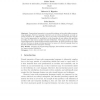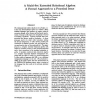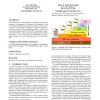539 search results - page 13 / 108 » The Semantic Gap of Formalized Meaning |
112
click to vote
CADE
2004
Springer
16 years 1 days ago
2004
Springer
Formal semantic definitions of concurrent languages, when specified in a well-suited semantic framework and supported by generic and efficient formal tools, can be the basis of pow...
81
Voted
AO
2005
14 years 11 months ago
2005
The paper considers the problem of defining concepts within formal ontologies. A number of distinct modes of definition are identified, which represent alternative viewpoints on t...
JUCS
2008
14 years 11 months ago
2008
Abstract: Denotational semantics is a powerful technique to formally define programming languages. However, language constructs are not always orthogonal, so many semantic equation...
ICDE
1994
IEEE
15 years 3 months ago
1994
IEEE
The relational data model is based on sets of tuples, i.e. it does not allow duplicate tuples in a relation. Many database languages and systems do require multi-set place, the hi...
WWW
2003
ACM
16 years 12 days ago
2003
ACM
The Sematic Web is vitally dependant on a formal meaning for the constructs of its languages. For Semantic Web languages to work well together their formal meanings must employ a ...



